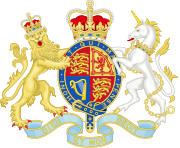Minister of Defence for the Royal Navy
| United Kingdom Office of the Minister of Defence for the Royal Navy | |
|---|---|
 Seal of HM Government | |
| Navy Department | |
| Style | The Right Honourable (Formal prefix) Minister of Defence for the Royal Navy |
| Member of | Defence Council Admiralty Board Navy Board |
| Seat | Westminster, London |
| Appointer | The British Monarch on advice of the Prime Minister |
| Term length | No fixed term |
| Formation | 1964-1967 |
| First holder | George Jellicoe, 2nd Earl Jellicoe |
| Final holder | Sir J. P. William Mallalieu |
The Minister of Defence for the Royal Navy[1] was a senior ministerial appointment of the British Government established in April 1964. The office holder was the ministerial head of the Navy Department of the Ministry of Defence, and reported to the Secretary of State for Defence.
This office replaced the former cabinet position of First Lord of the Admiralty, though this office holder was not a member of the cabinet. On 6 January 1967 this post was abolished and replaced by the Parliamentary Under-Secretary of State for Defence for the Royal Navy.[2]
History
[edit]On 25 April 1964, the functions of the Department of Admiralty was absorbed into an enlarged Ministry of Defence where it was renamed the Navy Department.[3] The office of the First Lord of the Admiralty, the cabinet minister responsible for the admiralty was abolished. The final post holder was George Jellicoe, 2nd Earl Jellicoe, he became the first incumbent of the new office of Minister of Defence for the Royal Navy and held that position until October 1964.[4]
At the same time the executive Board of Admiralty was abolished and replaced by a new Admiralty Board, whilst an additional subcommittee of the admiralty board was created called the Navy Board. The Minister of State for the Royal Navy was a member of both boards. In January 1967 this office was abolished and renamed Parliamentary Under-Secretary of State for Defence for the Royal Navy.[5]
Office Holders
[edit]- The Rt. Hon. George Jellicoe, 2nd Earl Jellicoe, 25 April 1964 – 19 October 1964.[6]
- The Rt. Hon. Sir Christopher Mayhew, 19 October 1964 – 19 February 1966.[7]
- The Rt. Hon. Sir J. P. William Mallalieu, 19 February 1966 – 6 January 1967.[8]
References
[edit]- ^ "Defence (Navy) Estimates, 1964–65". hansard.parliament.uk. London, England.: House of Commons: Hansard. 2 March 1964. Retrieved 1 November 2019.
- ^ Steinberg, S. (2016). The Statesman's Year-Book 1967-68: The One-Volume ENCYCLOPAEDIA of all nations. London: Macmillan St Martins Press. p. 103. ISBN 9780230270961.
- ^ Benbow, Dr Tim (2013). British Naval Aviation: The First 100 Years. Farnham, United Kingdom.: Ashgate Publishing, Ltd. p. 179. ISBN 9781409482369.
- ^ Hazlehurst, Cameron; Whitehead, Sally; Woodland, Christine (1996). A Guide to the Papers of British Cabinet Ministers 1900-1964. Cambridge, England.: Cambridge University Press. p. 206. ISBN 9780521587433.
Minister of State for the Royal Navy 1964.
- ^ Hughes, Geraint (2015). Harold Wilson's Cold War: The Labour Government and East-West Politics, 1964-1970. Woodbridge, United Kingdom.: Boydell & Brewer Ltd. p. xvii. ISBN 9780861933327.
- ^ Hazlehurst, Whitehead and Woodland p. 206.
- ^ "Obituary: Lord Mayhew". The Independent. London, England. 9 January 1997. Archived from the original on 2022-05-15. Retrieved 1 November 2019.
- ^ "NAVY MINISTER TAKES THE TRADITIONAL ROUTE. JUNE 1966, ON BOARD THE GUIDED MISSILE DESTROYER HMS KENT, AT SEA OFF PORTLAND. WHILE VISITING THE ROYAL NAVY BASE AT PORTLAND MR J P W MALLALIEU, MP, MINISTER OF DEFENCE (ROYAL NAVY) WENT TO SEA IN THE FRIGATE HMS CLEOPATRA AND LATER TRANSFERRED TO THE GUIDED MISSILE DESTROYER HMS KENT". iwm.org.uk. London, England.: Imperial War Museums. June 1966. Retrieved 2 November 2019.
